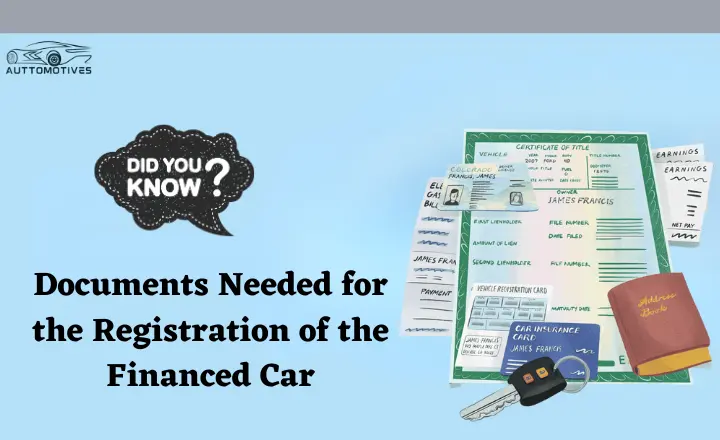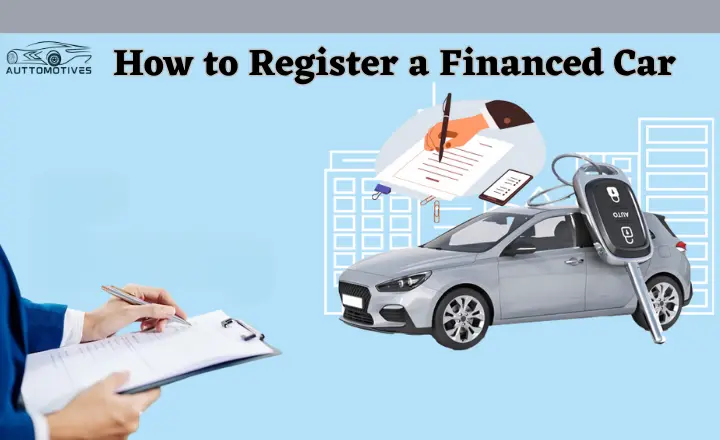Registering a financed car in the United States may seem daunting, but ensuring that how to register a financed car and your vehicle is legally registered and protected is essential. To begin with, you will need to gather all necessary documents, such as your proof of identity, title, and auto insurance documents. These documents are crucial in establishing ownership and ensuring you have met the legal requirements for operating a vehicle on public roads. Where you will submit the required paperwork and payment receipt. You will also need to undergo a VIN inspection, which helps verify that the vehicle’s identification number matches its registration information.
How to Register a Financed Car?
The most important step when purchasing a car is to register it with your state’s Department of Motor Vehicles (DMV). This process can vary depending on your state and whether you are buying a car from a dealership or a private seller. If you’ve financed your vehicle, there are additional steps you’ll need to take to ensure that everything is properly registered. Gather all necessary paperwork, such as the bill of sale, loan agreement, and proof of insurance. Check with your lender to see if they require specific forms or documentation to register a financed car. The lender will have their lien information filed with the DMV so that they are listed as the primary lienholder on the title. Understanding how to put a lien on a car is crucial for those with outstanding loans or lease agreements. A lien is a legal document that gives a creditor the right to seize property to satisfy a debt. A lien can be placed on real estate, personal property, or money. Once you have all the necessary documents, head to your local DMV office or use their online portal if available.

Dealer purchases:
Authorized dealers are an essential part of the vehicle purchasing process. They have legal permission to issue registration documents and license plates, complete all necessary titling processes, and charge initial registration fees at purchase. It eliminates any inconvenience that may occur if you were to try and navigate these processes yourself. It is highly recommended that you ask your dealer to carry out electronic and automatic registration and electronic filing systems for ease of access and convenience.
Authorized dealers can provide the necessary documents for transferring vehicle deeds within a 30-day timeline or less. If they fail to meet this deadline, contacting your motor vehicle department will be crucial to proceed. Working with authorized dealers is always beneficial when purchasing vehicles because they take on much of the administrative burden of registering a new car or transferring ownership between two parties.
Leased vehicle registration:
Many people assume that the dealership will handle everything on their behalf. And while this is true in many cases, it’s important to understand exactly what this process entails. In most states, the dealer will complete the titling process for their clients when they lease a car. It means they’ll submit all necessary paperwork and fees to the DMV to ensure everything is in order. One thing to remember is that leasing a vehicle can be more expensive than owning one, especially regarding registration costs. It is because leased vehicles are typically registered under a different set of rules and regulations than those owned by individuals. For example, some states require lessees to pay additional fees or taxes based on the length of their lease or the value of their car.
Initial taxes and registration fees:
It is important to ensure that the vehicle registration contract includes all necessary details regarding paid fees and title. It is because some contracts may not contain this information, which can lead to confusion and additional charges. In such cases, traders will typically ask buyers for the exact dollar amount regarding paid fees. It is also worth noting that dealers may add extra filing fees for registration and vehicle fees during the process. These charges should be enclosed separately from other initial taxes and registration fees. By doing so, dealers can help ensure transparency in their pricing and avoid any potential misunderstandings with customers. It is important to carefully review all aspects of your registration contract before finalizing your purchase. By doing so, you can avoid any unexpected costs or complications down the line – ensuring a smooth and hassle-free buying experience.
Private party purchases:
When buying a car privately, it is important to remember that you will have to handle all the paperwork on your own. It means filling out registration forms and titling documents before submitting them to the county collector’s office. The most crucial document you will need is a sale document that records the purchase agreement with the previous owner. This form should be completed with the seller to ensure there is an official record of the transaction. It is worth noting that while it is ultimately up to the seller to file this form with their local tax collector’s office, as a buyer, you should always keep a copy for your records. Doing so ensures you have proof of ownership and can provide evidence of payment if necessary in future transactions or disputes. Selling a car with an expired registration can seem like a daunting task. So, can you trade in a car with expired registration? When it comes to selling or trading in your car, you may be wondering if having an expired registration will affect the process. It’s not uncommon for drivers to forget about renewing their vehicle registration, and sometimes life gets in the way, causing them to fall behind on their payments.
Follow the below-given steps for registration:
Are you planning to buy a used car? The most crucial thing you must do is ensure that the vehicle’s title matches its previous owner. It is essential because it will help avoid any legal issues in the future. It’s also vital to double-check the VIN on the car and compare it with its title. If everything matches, then you’re good to go. If no FL (Florida) title is available, you must opt for a VIN inspection. Filling out necessary documents like mileage and odometer statements, which are required for vehicles less than ten years old. After completing all documentation requirements, submit them with proof of insurance at your local county tax collector’s office. The agent will review all documents and process them accordingly.
1. Write down the car title and the previous owner’s name.
2. Check the vehicle’s VIN and ensure it matches the VIN on the title. If the FL title is missing, go for a VIN inspection.
3. Fill out the mileage document and odometer if the vehicle is less than ten years old.
4. Submit all the required documents, including the title, to the county’s tax collector’s office.
5. Show proof of insurance in the USA.
6. Pay the registration fees, which include titling fees, registration fees, county fees, and possible temporary license plate fees.
7. Obtain license plates and registration stickers.
Documents Needed for the Registration of the Financed Car:
To register a financed car, you must have all the necessary documents. The Department of Motor Vehicles (DMV) requires you to present your license plate, certificate of title, and other essential papers, like proof of insurance and a bill of sale. These documents are necessary to transfer your vehicle’s ownership from one state to another. The process for registration may vary depending on each state’s DMV regulations. Generally, you will need all required documentation before heading to the regional office. Once there, a department representative will review your paperwork and ensure everything is in order. They’ll then register your transfer deed with out-of-state essentials so you can legally drive on the roads in your new home state. You must remember all essential documents when registering your financed car.

- The car’s registration involves several parties, including the county tax collector’s office, any police officer, any car licensed dealership, DMV inspectors, a notary public, and an active-duty military officer.
- Each party plays a crucial role in ensuring the registration process is completed accurately and efficiently.
- The county tax collector’s office ensures that all necessary taxes are paid and recorded, while police officers may verify the ownership of the vehicle.
- Car licensed dealerships assist with the sale and transfer of ownership, while DMV inspectors ensure that all safety requirements are met.
- A notary public can provide legal certification for certain documents.
- Finally, an active-duty military officer may be involved if the owner is in the military or the vehicle is registered on a military base. Together, these parties ensure that every car is properly registered and safe for use on public roads.
Conclusion:
Registering a financed car in the United States may seem like a lot of work, but ensuring that how to register a financed car is legally compliant and protected while driving on public roads is crucial. By gathering all necessary documents and visiting your local DHSMV location, you can easily complete the registration process and obtain new license plates for your vehicle. Remember to undergo a VIN inspection to ensure your vehicle’s identification number matches its registration information. Registering your financed car properly will save you from any legal complications down the line and give you peace of mind as you hit the road.
Frequently Asked Questions:
How do I visit my local DHSMV location to register a financed car?
You must bring certain documents to register a financed car at your local Department of Highway Safety and Motor Vehicles (DHSMV) location. You will need to bring proof of ownership. You will also need proof of insurance for the vehicle and the lienholder’s name and address if it is a financed car.
What is the VIN inspection process?
A VIN inspection is a process used to verify the identity of a vehicle. It involves comparing the Vehicle Identification Number (VIN) on the vehicle with the VIN that is stored in a government database. This process aims to ensure that the vehicle has not been stolen, tampered with, or altered in any way.
What documents are required for registering a financed car in the United States?
Visiting your local Department of Highway Safety and Motor Vehicles (DHSMV) location is the best way to register your car. Before you visit, ensure you have all the necessary documents and fees ready. You will need proof of ownership, insurance, and a valid form of payment for the registration fee.

